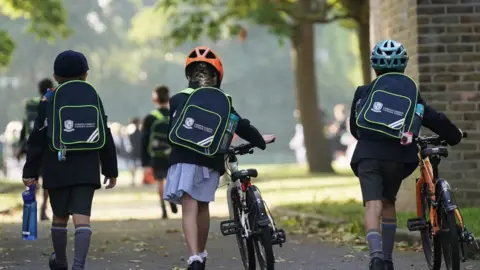Labour move to force school funding documents fails
 PA Media
PA MediaLabour has failed in its bid to force the release of documents about school repairs spending when Rishi Sunak was chancellor.
The party wanted ministers to publish details of past funding decisions after school closures due in England due to crumbling concrete.
But the attempt was blocked after the government ordered Conservative MPs to vote it down.
Education Secretary Gillian Keegan accused Labour of "playing politics".
She said the documents, on past spending negotiations, contained "sensitive" information - and disclosing them would jeopardise the ability of officials to offer frank advice to ministers in the future.
But shadow education secretary Bridget Phillipson accused her of trying to "spread responsibility" for the crisis, adding the prime minister needed to "come clean" about what he knew of the risks.
"The Conservatives have voted to cover up the truth about the prime minister's failure to act on dangerous buildings and the true scale of this crisis," she said.
Labour targets Sunak
Labour's motion comes after more than 100 schools in England containing reinforced autoclaved aerated concrete (RAAC) were told last week they would have to introduce safety measures, involving some partial and full closures.
RAAC was used in various types of building between the 1950s and 1990s, but the material, a cheaper alternative to standard concrete, has a lifespan of around 30 years.
Although concerns about the material have been around for a while, the recent announcement about schools has sparked a political wrangle about previous levels of investment for repairs.
Since the announcement, Labour has increasingly sought to put Mr Sunak's record in the spotlight by questioning funding decisions he made when he was chancellor.
It used a parliamentary procedure called a humble address to try and force the release of documents on spending negotiations between the education department and the Treasury from from 2020 to 2022, when Mr Sunak was chancellor.
But the move was defeated by 309 votes to 175 in a vote in the House of Commons.
Little used before Brexit, this procedure has increasingly been employed by Labour in recent years to embarrass Tory MPs, who are normally expected to vote with the government.
After a similar vote on school safety in May, individual MPs were targeted with attack ads on social media for not backing a Labour motion to release buildings survey data.
In a sign the tactic is likely to be used again, Ms Phillipson said before the vote that Conservatives who vote against their latest motion would be voting to "conceal the true scale of this crisis".

Schools concrete crisis

Speaking ahead of the vote, Ms Keegan said the the government had acted "responsibly and decisively" in response to three cases over the summer that raised safety fears.
She told MPs that the crisis was "50 years in the making", adding that guidance on managing RAAC had been around since 1994 and "nobody is blameless".
On Monday, Jonathan Slater, a former senior civil servant in the education department, said that analysis from 2019 had found that between 300 and 400 schools needed rebuilding each year.
Mr Slater told the BBC the department had initially secured funding for 100 a year, but that Mr Sunak later took the decision to "halve the size of the programme".
Schools Minister Nick Gibb acknowledged his department had put in a bid for 200 refurbishments a year in 2021 but the Treasury had only funded 50.
He also said that since Mr Sunak became prime minister, £4bn had been added to revenue funding for schools in England, meaning £59.6bn would be in the budget next year, a "record amount".
The DfE has said that so far, of the 500 schools it has committed to rebuilding by 2030, only four have been completed. The department says it expects the rate to increase towards the end of the decade.
